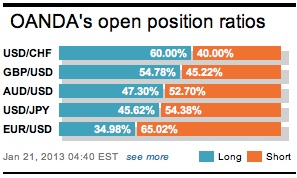Capital Markets are so far calm this Monday morning, especially since the US markets are closed in observance of the Martin Luther King Jr. holiday. Global investors are digesting on the potential signs that a US debt ceiling compromise may be in the offering. Late Friday, US Republican members indicated that they would not object to a three-month increase to the US debt ceiling, giving Congress the time required to pass a budget. Despite being perceived as perhaps another temporary fix or further kicking of the “can” down the road, strategists see this action by the US Republican Party as a significant shift in the party’s political strategy. The Republican actions should ease many political pundits concerns and reduce some of the financial market stress undertone.

After falling steadily for months, deprecating -15% since September, the next step for the Yen should be mapped out by the Bank of Japan this week. The currency’s direction will be determined by whether the central bank will announce additional monetary easing after concluding its two-day meeting tomorrow, again reducing the attractiveness of one of the world’s major currency’s. Many expect Governor Shirakawa to announce another incremental +¥10t increase in its asset purchase plan and agree to a +2% inflation objective. It could be the first time that the Japanese policy makers expanded its monetary policy at two-consecutive board meetings in a decade and solidifying the first significant political win for the newly minted Abe government. They won last months elections on a platform of aggressive monetary and fiscal policy.
The market should not be surprised to see some yen buying on the announcement, similar to last nights JPY outright currency move. So far, much of the changes have been talked about and already priced into the current market. However, this market (89.50) does not yet seem ready to walk away from betting on the JPY weakening further any time soon. The currency outright is expected to find strong buying interest on pullbacks, as the market anticipates further easing measures at future meetings and of the arrival of a more dovish BoJ governor in April. Could the Central Bank sideswipe this market by delivering more tomorrow? Policy members may insist on cutting interest payment on bank reserves or perhaps set a monthly agenda of asset purchases over no specific time frame. But, will this course of action weaken the yen even further? It seems that the BoJ will insist on a course of action that will have the most impact on his own currency, something sustainable. Too much of a shock in one go may not achieve the same. Who said we were not in a currency war?
The Euro-group gets its own opportunity today to complain about the EUR’s consistent strength of late. Last week, the market witnessed Euro “Ping-Pong” rhetoric on the single unit. The Euro-group’s President Jucker complained that the currency’s recent +8% gain would hinder economic growth in the region, while ECB member, Nowotny, does not expect a currency war despite a slowdown. The EUR’s +26% appreciation against the Yen over the last six months should be expecting verbal intervention, at least on the exporters behalf. Today, the Euro-finance ministers should also be focusing on the review of Cyprus’ bank recapitalization needs and are expected to approve the disbursement of the +€9.2b aid sub-tranche to Greece.

The market can expect liquidity to be rather questionable stateside today, as US markets are closed in observance of the Martin Luther King Jr. holiday. Many observers are expecting a limited pullback for the EUR in the short term. Euro-policy maker’s rhetoric is not anticipated to trump the apparent strong demand for the peripheral euro-zone’s bond auctions. Of late, the single units demands have been well supported by yield-spread movements. Overall, speculators are long the EUR, below 1.3280, in anticipation for gains towards 1.3480-1.35 (last year’s high posted in February). Daily momentum remains positive, however, market stop-losses continue to be raised towards that 1.3260-80 level. Will this thin market be tempted to clear them out first?

Other Links:
US Economic Data Mixed as Debt Ceiling Looms
This article is for general information purposes only. It is not investment advice or a solution to buy or sell securities. Opinions are the authors; not necessarily that of OANDA Corporation or any of its affiliates, subsidiaries, officers or directors. Leveraged trading is high risk and not suitable for all. You could lose all of your deposited funds.



